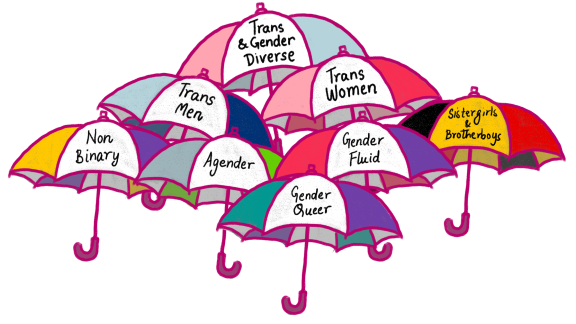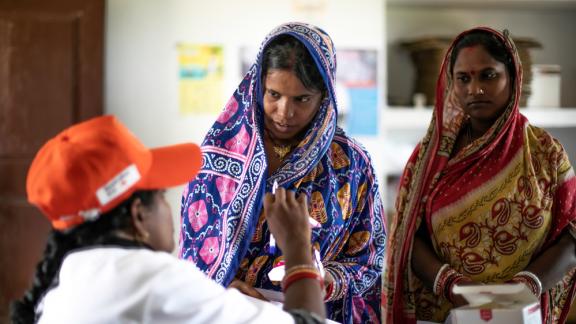Since 2012, every 14th of July has been celebrated as International Non-Binary People's Day, intentionally situated at the midpoint between International Women's Day (8 March) and International Men's Day (19 November). This significant occasion not only celebrates non-binary individuals but also fosters an essential dialogue about gender diversity and sexual and reproductive health rights (SRHR).
To understand the term 'non-binary,’ sometimes affectionately abbreviated to 'enby', we must first acknowledge that it is an umbrella term for all people who do not fit wholly within the traditional definitions of 'man' or 'woman.’ Non-binary people may identify as both a man and a woman, somewhere in between, or as having no gender.
At IPPF we acknowledge a vibrant spectrum of gender identities that are not strictly male or female, such as agender, bigender, genderfluid, and various unique self-identifications. We believe that celebrating these diverse identities deepens our understanding and progress towards a more inclusive society.
We also recognize the rich diversity of indigenous cultures worldwide that have acknowledged non-binary and other diverse gender identities for centuries. From the Two-Spirit people in many Native American cultures to the Hijra community in South Asia, indigenous non-binary identities form a vibrant part of our heritage. Respecting these identities strengthens our commitment to inclusivity and respect for indigenous cultures.
Non-Binary Day is more than a celebration; it's an urgent call to challenge norms around gender, increase the visibility of non-binary individuals, and address the unique issues they face. A critical area demanding our attention and reform is healthcare.
Despite increased visibility, the healthcare experiences of many non-binary individuals are marred by misunderstanding and lack of inclusivity. Many non-binary individuals share distressing experiences of being misgendered by healthcare providers, highlighting the urgent need for education alongside improved service delivery.
Healthcare services, especially Family Planning (FP) and Sexual and Reproductive Health (SRH), often exclude non-binary clients due to restrictive policies and inadequate guidance. However, change is within reach. By implementing actionable steps that prioritize respectful interactions, we can significantly improve the healthcare experience for non-binary individuals.
Practical service provision should focus on meeting the unique health needs of non-binary individuals. This includes inclusive contraceptive care and sexual health services tailored not to a patient's gender identity but to their specific needs and desires. Reliable referral systems should be in place for services unavailable at a particular facility. Inclusive contraceptive care and sexual health services should be tailored not to a patient's gender identity but to their specific needs and desires. For instance, a non-binary individual with female reproductive anatomy might visit a clinic seeking contraceptive care and sexual health services. Providers should focus on understanding this individual's unique needs, rather than making assumptions based on physical characteristics or gender identity.
The individual might be seeking to avoid pregnancy, require protection from sexually transmitted infections, or both. Their care could involve discussion on suitable contraceptive methods, ranging from hormonal contraceptives and intrauterine devices to barrier methods. Information about regular STI screenings and prevention could also be provided.
Should a specific service be unavailable at the clinic, a reliable referral system comes into play. This enables the healthcare provider to connect the patient with a trusted facility that can deliver the needed service, ensuring continuity and quality of care. This approach prioritizes individual needs over assumptions based on gender identity, fostering an inclusive healthcare environment.
To build trust, we need to respect the dignity of non-binary individuals throughout clinical interactions. This involves using respectful language, avoiding intrusive questions, and steering clear of assumptions about a patient's gender identity and care needs.
Understanding and addressing the unique stresses faced by non-binary individuals, like chronic anxiety related to potential healthcare discrimination, is essential to providing trauma-informed care. These lived realities must inform our approach to mental health care and support.
Recognising and responding to the unique stresses faced by non-binary individuals, such as chronic anxiety due to potential healthcare discrimination, is essential for providing trauma-informed care. The lived experiences of these individuals must guide our mental health care approach and support strategies.
IPPF South Asia Region has made significant strides toward this end. Our work in Nepal exemplifies this commitment, where we have launched the nation's first gender-affirmative clinic in Kathmandu. The clinic offers many services ranging from queer affirmative and gender identity-related counseling to HIV/SRHR services and non-communicable disease screening. In addition to these, we also provide hormone therapy, subsidised laser reduction services, and free consultations with queer-friendly healthcare professionals such as endocrinologists, psychiatrists, and gynaecologists.
In pursuit of true inclusivity, IPPF is dedicated to empowering diverse groups
We acknowledge that while non-binary individuals have the same rights to quality healthcare as others, our healthcare systems need to evolve to safeguard these rights effectively.
Non-binary people’s lives, experiences, and identities are multi-faceted, and our approach to their healthcare must reflect this complexity. It's time we moved from awareness to action. This Non-Binary Day let’s strive to make incremental progress every day in inclusive healthcare and beyond.
Authored By: Sonal Giani, Senior Advisor, Gender and Inclusion, IPPF
when
region
South Asia

"IPPF South Asia Region has made significant strides toward this end. Our work in Nepal exemplifies this commitment, where we have launched the nation's first gender-affirmative clinic in Kathmandu. The clinic offers many services ranging from queer affirmative and gender identity-related counseling to HIV/SRHR services and non-communicable disease screening. In addition to these, we also provide ...












